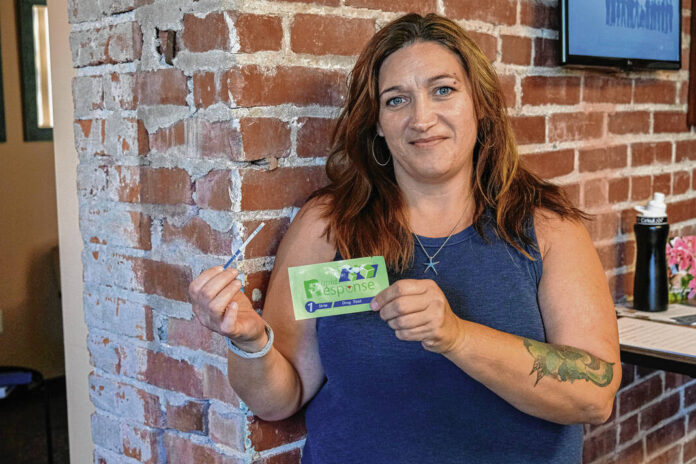
Outreach specialist Alison Grimes displays fentanyl test strips at the Alliance for Substance Abuse Progress Hub in Columbus in July. Grimes said she believes a change in federal law allowing authorized doctors to more freely prescribe controlled medications to treat addiction will reduce fatal overdoses and improve treatment outcomes.
Republic file photo
A nonpartisan rural Indiana grassroots group, as well as a Columbus woman who is helping local people recover from opioid addiction, are hailing a recent change in federal law that they believe will curb drug overdose deaths and allow more people to obtain effective medication-assisted addiction treatment.
Hoosier Action is hailing the passage of the Mainstreaming Addiction Treatment (MAT) Act, which was included in the omnibus spending package signed into law last week by President Joe Biden. The MAT Act had bipartisan support. It was co-sponsored by Indiana Reps. Trey Hollingsworth (R-Jeffersonville) and Andre Carson (D-Indianapolis), as well as by Republican Mike Braun in the Senate.
According to Hoosier Action, the MAT Act cuts through federal red tape to prevent overdoses, increase participation in recovery programs and reduce stigma by expanding access to proven addiction treatments. Significantly, doctors with a license to prescribe controlled substances now may prescribe medications such as buprenorphine to treat addiction disorder without having to go through a federal waiver process described as burdensome.
“This is a huge step forward for our community,” said Alison Grimes, outreach specialist for the Bartholomew County Alliance for Substance Abuse Progress.
According to Hoosier Action, Grimes noted her own recovery from opioid addiction has been aided with medication. But she said before the MAT Act was passed, access to treatments such as hers were complicated by federal rules.
“In the early days of my own recovery journey, I had to spend three hours every day traveling to receive medication assisted treatment,” she said in a statement shared by Hoosier Action. “In addition to the time and financial burdens it caused me, I was faced with the stigma and shame that comes with admitting I had a problem and needed help. I believe that, when the MAT Act passes into law, it will lower many barriers to treatment by making it easier for someone with substance use disorder to ask their care providers for help.”
Scientific studies show that medication assisted treatment is one of the most effective treatments for opioid use disorder and prevents overdose deaths.
Hoosiers from across the state worked tirelessly to advocate for the MAT Act by sharing their personal experiences, meeting with legislators, and calling for bipartisan collaboration to save lives, Hoosier Action said.
Previously, the burdensome waiver requirement discouraged healthcare providers from integrating medication-assisted treatment in their practices, Hoosier Action said, and perpetuated stigma against patients who would benefit from buprenorphine treatment.
“This is a huge win for Indiana, and it’s a critical first step towards ending the overdose crisis,” said Kate Hess Pace, executive director of Hoosier Action. “Given the magnitude of the crisis, Hoosiers need more legislative leadership and action to reduce stigma and shame around drug use, and more funding for harm reduction services and treatment.”
Federal legislation reflects a problem that is national in scope. The US Centers for Disease Control and Prevention last week reported that 106,699 died of drug overdoses in 2021, an increase of nearly 16% over the total from 2020.
Hoosier Action describes itself as a nonpartisan, homegrown community organization based in rural and small-town Indiana that believes all Hoosiers, regardless of how much money they make, should have a say in the decisions which affect their lives.




